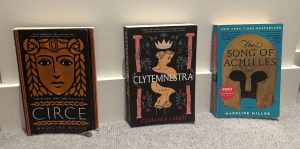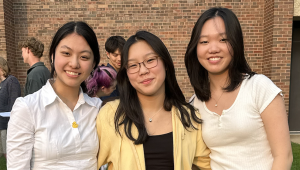Parents of New Trier opt out of Seminar Day, joins Project HOOD
Students travel to South Side for alternative service
March 8, 2017
On Tues., Feb. 28, while the school hosted its Seminar Day to bring attention to the issue of racial civil rights, a group of students chose to opt out of the event and go to the South Side of Chicago to participate in an initiative called Project HOOD.
Project HOOD is an organization started in 2012 by Pastor Corey Brooks, leader of the New Beginnings Church of Chicago. The acronym HOOD stands for “helping others obtain destiny.”
According to Project HOOD’s website, its mission is “to empower people with the guidance, information, and tools necessary to become peacemakers, problem solvers, leaders, and entrepreneurs in their communities.”
Through programs including mentoring, entrepreneur school, and film-making, Project HOOD equips at-risk youth with the skills they need to succeed despite the unfortunate circumstances of where they start.
Most of the New Trier students who joined up with Project HOOD were connected to a group called Parents of New Trier, who were concerned about bias in the content of the program.
“The racial seminar as it was designed and executed was neither balanced nor inclusive,” said parent Jasmine Hauser.
The group started a website to educate others about their issues with Seminar Day and to bring in speakers with a variety of perspectives on the topic of inequality.
When they were unable to get any of their speakers into Seminar Day, they decided to create an alternate option for students who wanted it.
Students started at the New Beginnings Church in Chicago, learned about the background of the South Side, toured the area, and had lunch with students from an alternative school nearby.
While Seminar Day was titled, “Understanding today’s struggle for racial civil rights,” Brooks found the emphasis on race to be detrimental to the process of achieving civil rights.
In a Chicago Tribune article Brooks wrote about Seminar Day, he said, “‘Race dictates everything’ appeared to be the aim of New Trier’s scheduled workshops.”
He expressed his desire to shift the focus to economics, saying, “Discrimination is alive and well, but it is economic discrimination.”
Instead of exploring the idea of systemic racism, Brooks and the Parents of New Trier thought it would more helpful to take the day to introduce students to others whose backgrounds might contrast with theirs.
According to the Parents of New Trier website, “Peer review studies increasingly show that diversity programs like this create more harm than they do good, because they reinforce racial stereotypes and resentments. In contrast, activities or working with people from different racial backgrounds can enhance relationships.”
This view is what caused them to place an emphasis on seeing the South Side and its community in person.
Jasmine Hauser found that their time with the students confirmed the belief that economic distinctions play a larger role in inequality than race. “All of the kids –who happened to be black– emphasized that racism is not the primary issue that affects their community, rather it’s educational and economic opportunity,” she said.
Although senior Olivia Hauser wasn’t entirely against the idea of Seminar Day, she didn’t think that it did an adequate job of approaching the issue constructively.
“I think this day should probably include some black students or students of a different color from another school coming in and us interacting with them and learning how to become friends with them,” she said.
Senior Addison Downs also chose to participate in the project instead of Seminar Day.
“I saw a small bias in the opinions that were being voiced and thought that I could get more out of the day by participating in Project HOOD,” he said.
Downs acknowledged the benefits of Seminar Day’s discussion, but he thought that the project would give him a better idea of the challenges faced by those in other communities. He was bothered by the vast disparity between the lifestyles of those in the North Shore and those on the South Side.
“It seems crazy that here in Winnetka we spend $25,000 on water bottles and even more money on the Seminar Day, when 10 miles away they are going through all these problems,” he said.
Olivia Hauser was also skeptical of the impact that could be made solely through words.
“People could easily say, ‘This is what I believe. This is what I’m going to do,’ but there’s no action necessarily,” she said. “Why don’t we discuss it and then act on it with these kids?” said Hauser.
Senior Max Kanter, a student who helped organize Seminar Day, agreed that the issue of inequality must be solved using both words and actions.
“Simply discussing the issue won’t solve racism and solely acting won’t solve racism,” he said. “Students, parents, and staff need to be able to engage in conversations and then commit themselves to benevolently productive actions.”
Junior Arielle Imber, a student who led a session at Seminar Day, was also supportive of the Parents of New Trier’s decision to participate in Project HOOD.
“I’m glad those who participated did something productive and meaningful as an alternative to Seminar Day,” she said. “Still, it would have been really valuable to have their voices as part of the discussion, too”.











































